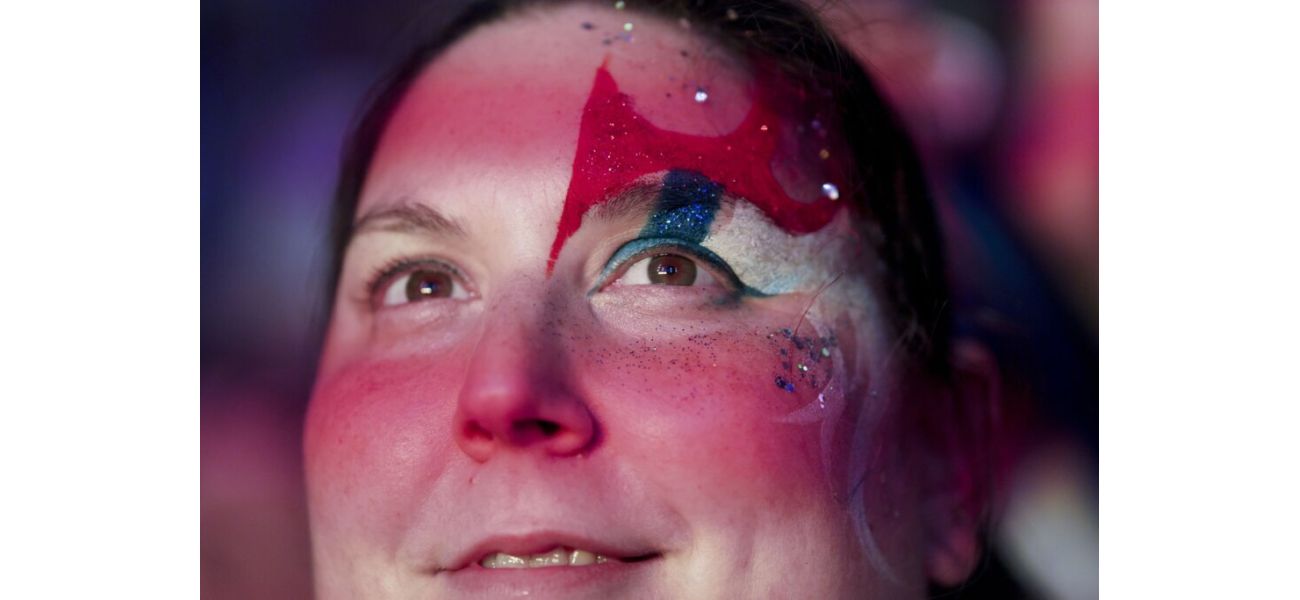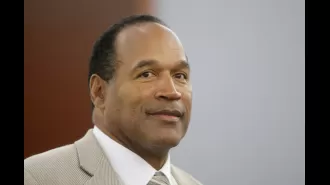Uruguay's exit polls suggest a runoff between 2 moderate candidates, defying the usual trend in Latin America.
Citizens of Uruguay eagerly awaited election results on Sunday in the small country of South America.
October 28th 2024.

In the small South American nation of Uruguay, voters were eagerly awaiting the results of their presidential election on Sunday. According to exit polls, the country's center-left alliance was pulling ahead of the incumbent conservative coalition, causing much anxiety among the citizens. The ballot counting continued for hours after the polling stations had closed, as the contest between two moderates defied the trend of division and democratic erosion seen in other Latin American countries.
The turnout for the election was reported to be at 89% of the 2.7 million eligible voters in Uruguay, a country known for its model democracy and stability. Voting in both presidential and congressional contests is compulsory in Uruguay, further emphasizing the importance of this election. With just over 40% of actual votes counted, exit polls by four prominent polling agencies predicted that leftist candidate Yamandú Orsi, a two-time rural mayor and former history teacher, would receive around 42%-44% of the vote and take the lead over his rival, Álvaro Delgado, the center-right government's candidate.
However, the initial surveys of voters leaving the polls suggested that Orsi would not reach the 50% threshold needed to avoid a runoff on November 24th. This reflects the voter apathy seen in this civilized presidential race between two candidates whose priorities overlap. According to the exit polls, Delgado, the former chief of staff under President Luis Lacalle Pou, who started his career as a rural veterinarian, was expected to receive around 27-28% of the vote.
While neighboring countries like Brazil and Argentina have recently seen their citizens expressing their anger towards the status quo through their votes, Uruguay's electorate remains largely satisfied with Lacalle Pou's tenure. The president, who is barred from running for a second consecutive term, leaves office with a 50% approval rating. The main focus of the electoral contest has been the rise in homicides and robberies, with the governing coalition advocating for a tough-on-crime approach, while the liberal coalition seeks to increase the state's role in security matters.
Voters in Uruguay also have concerns about the one in five children living in poverty and the low rate of high school graduations. Political analyst Julián Kanarek, based in Montevideo, described this as a presidential campaign that was "far removed from the people" and failed to achieve the usual levels of engagement seen in Uruguay. Speaking to thousands of energized supporters in Montevideo as the vote tallies were being transmitted, Orsi expressed cautious optimism, saying "we are going in for these 27 days," referring to the final campaign push before the expected second round next month. He also declared that "the Broad Front is once again the most voted party in Uruguay," showcasing the support for the coalition of center-left and leftist parties that held the presidency from 2005-2019.
This show of support for the Broad Front signals a desire for a stronger social safety net in one of Latin America's most expensive countries. Uruguay's population is aging, and one in five children lives in poverty, so there is a growing need for higher pensions. During its 15 years in power, the Broad Front oversaw robust economic growth and implemented socially liberal laws, including the pioneering legalization of abortion, same-sex marriage, and recreational use of marijuana. Uruguay also has one of the world's greenest grids, with 98% of its energy coming from renewable sources.
Orsi's working-class roots, casual style, and promise to forgo many of the benefits enjoyed by heads of state have resonated with voters, who see him as having a similar folksy appeal to former president José "Pepe" Mujica. The 89-year-old former guerrilla and present-day chrysanthemum farmer helped lead Uruguay's transformation into the most socially liberal country in the region during his presidency from 2010-2015. Despite battling esophageal cancer, Mujica was still able to cast his ballot in Montevideo on Sunday, arriving in a wheelchair and being swarmed by reporters. He reminded them of the importance of supporting democracy, saying "we need to support it not because it's perfect, but because humans have not yet invented anything better."
As expected, exit polls showed Andrés Ojeda, a 40-year-old lawyer, in a distant third place. Ojeda has tried to energize apathetic young voters with flashy campaign videos, showcasing his weightlifting skills and describing himself as a "classic Capricorn." He supports the ruling coalition but has an unconventional style, drawing inspiration from other young charismatic leaders in Latin America, such as El Salvador's Nayib Bukele and Argentina's Javier Milei, who use social media to amass followers.
Ojeda's meteoric rise from obscurity has been a lesson to the system, according to him, as he believes that "the new politics is here to stay." The presidential campaigns in Uruguay have been relatively free of the vitriolic insults and personal attacks seen in other countries like the United States, Argentina, and Brazil. The most divisive issue in this election has been a constitutional referendum that would overhaul Uruguay's social security system. The vote, which could expand the fiscal deficit in one of Latin America's wealthiest countries, has received more media attention in recent weeks than other important campaign issues, like child poverty, education, and security.
If the referendum is approved by more than 50% of voters, it would introduce a $23 billion scheme that is supported by the country's powerful unions. It would lower the retirement age, increase pension payouts, and transfer privately managed savings to a government-run trust. Both leading candidates have spoken out against this proposal, which has already caused some concern in global markets. However, supporters argue that it would redistribute Uruguay's resources more fairly in one of the region's most expensive countries, where the average minimum pension is only around $450 a month.
After casting her vote and supporting the referendum, 61-year-old Amara De Los Santos said, "it's about defending our rights, because now I am about to retire."
Reported by DeBre from Buenos Aires, Argentina.
The turnout for the election was reported to be at 89% of the 2.7 million eligible voters in Uruguay, a country known for its model democracy and stability. Voting in both presidential and congressional contests is compulsory in Uruguay, further emphasizing the importance of this election. With just over 40% of actual votes counted, exit polls by four prominent polling agencies predicted that leftist candidate Yamandú Orsi, a two-time rural mayor and former history teacher, would receive around 42%-44% of the vote and take the lead over his rival, Álvaro Delgado, the center-right government's candidate.
However, the initial surveys of voters leaving the polls suggested that Orsi would not reach the 50% threshold needed to avoid a runoff on November 24th. This reflects the voter apathy seen in this civilized presidential race between two candidates whose priorities overlap. According to the exit polls, Delgado, the former chief of staff under President Luis Lacalle Pou, who started his career as a rural veterinarian, was expected to receive around 27-28% of the vote.
While neighboring countries like Brazil and Argentina have recently seen their citizens expressing their anger towards the status quo through their votes, Uruguay's electorate remains largely satisfied with Lacalle Pou's tenure. The president, who is barred from running for a second consecutive term, leaves office with a 50% approval rating. The main focus of the electoral contest has been the rise in homicides and robberies, with the governing coalition advocating for a tough-on-crime approach, while the liberal coalition seeks to increase the state's role in security matters.
Voters in Uruguay also have concerns about the one in five children living in poverty and the low rate of high school graduations. Political analyst Julián Kanarek, based in Montevideo, described this as a presidential campaign that was "far removed from the people" and failed to achieve the usual levels of engagement seen in Uruguay. Speaking to thousands of energized supporters in Montevideo as the vote tallies were being transmitted, Orsi expressed cautious optimism, saying "we are going in for these 27 days," referring to the final campaign push before the expected second round next month. He also declared that "the Broad Front is once again the most voted party in Uruguay," showcasing the support for the coalition of center-left and leftist parties that held the presidency from 2005-2019.
This show of support for the Broad Front signals a desire for a stronger social safety net in one of Latin America's most expensive countries. Uruguay's population is aging, and one in five children lives in poverty, so there is a growing need for higher pensions. During its 15 years in power, the Broad Front oversaw robust economic growth and implemented socially liberal laws, including the pioneering legalization of abortion, same-sex marriage, and recreational use of marijuana. Uruguay also has one of the world's greenest grids, with 98% of its energy coming from renewable sources.
Orsi's working-class roots, casual style, and promise to forgo many of the benefits enjoyed by heads of state have resonated with voters, who see him as having a similar folksy appeal to former president José "Pepe" Mujica. The 89-year-old former guerrilla and present-day chrysanthemum farmer helped lead Uruguay's transformation into the most socially liberal country in the region during his presidency from 2010-2015. Despite battling esophageal cancer, Mujica was still able to cast his ballot in Montevideo on Sunday, arriving in a wheelchair and being swarmed by reporters. He reminded them of the importance of supporting democracy, saying "we need to support it not because it's perfect, but because humans have not yet invented anything better."
As expected, exit polls showed Andrés Ojeda, a 40-year-old lawyer, in a distant third place. Ojeda has tried to energize apathetic young voters with flashy campaign videos, showcasing his weightlifting skills and describing himself as a "classic Capricorn." He supports the ruling coalition but has an unconventional style, drawing inspiration from other young charismatic leaders in Latin America, such as El Salvador's Nayib Bukele and Argentina's Javier Milei, who use social media to amass followers.
Ojeda's meteoric rise from obscurity has been a lesson to the system, according to him, as he believes that "the new politics is here to stay." The presidential campaigns in Uruguay have been relatively free of the vitriolic insults and personal attacks seen in other countries like the United States, Argentina, and Brazil. The most divisive issue in this election has been a constitutional referendum that would overhaul Uruguay's social security system. The vote, which could expand the fiscal deficit in one of Latin America's wealthiest countries, has received more media attention in recent weeks than other important campaign issues, like child poverty, education, and security.
If the referendum is approved by more than 50% of voters, it would introduce a $23 billion scheme that is supported by the country's powerful unions. It would lower the retirement age, increase pension payouts, and transfer privately managed savings to a government-run trust. Both leading candidates have spoken out against this proposal, which has already caused some concern in global markets. However, supporters argue that it would redistribute Uruguay's resources more fairly in one of the region's most expensive countries, where the average minimum pension is only around $450 a month.
After casting her vote and supporting the referendum, 61-year-old Amara De Los Santos said, "it's about defending our rights, because now I am about to retire."
Reported by DeBre from Buenos Aires, Argentina.
[This article has been trending online recently and has been generated with AI. Your feed is customized.]
[Generative AI is experimental.]
0
0
Submit Comment





